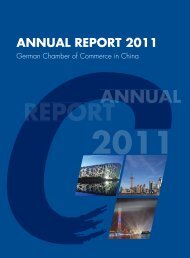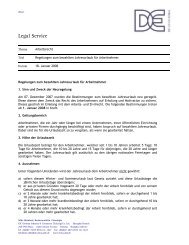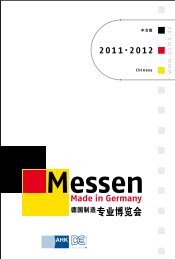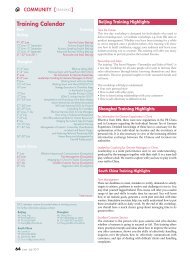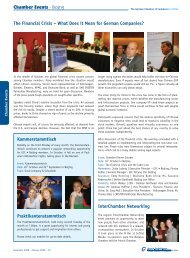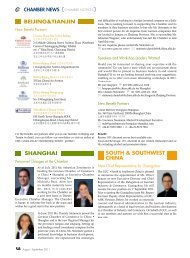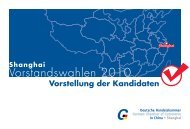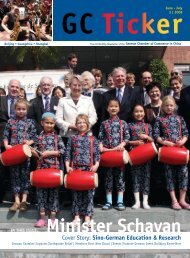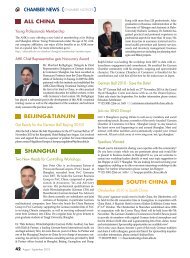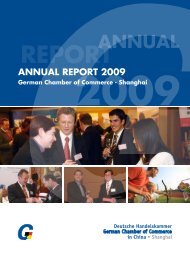Minister Steinmeier - AHKs
Minister Steinmeier - AHKs
Minister Steinmeier - AHKs
Create successful ePaper yourself
Turn your PDF publications into a flip-book with our unique Google optimized e-Paper software.
Business Focus<br />
Cover Story<br />
August - September 2008 | 10<br />
The German Chamber of Commerce in China<br />
Sino-German Dialogue Revived<br />
<strong>Steinmeier</strong> and Chinese officials inject new energy into bilateral relations<br />
The Dialogue on Urbanization<br />
© Goethe-Institut Peking / Jiang Ziwei<br />
German Foreign <strong>Minister</strong> Frank Walter <strong>Steinmeier</strong>’s visit to China in mid-<br />
June reignited talks between the two countries. Stopping first in the<br />
capital, the foreign minister moved on to a Yangtze River boat tour,<br />
attended a conference on urbanization in Chongqing and visited the<br />
earthquake zone. During his visit, <strong>Minister</strong> <strong>Steinmeier</strong> covered topics<br />
ranging from business transparency to urbanization. Officials on both<br />
sides approached bilateral talks with a newfound enthusiasm and open,<br />
frank attitude.<br />
Officials Talk Policy Substance in Beijing<br />
In Beijing, <strong>Minister</strong> <strong>Steinmeier</strong>’s visit included meetings with Chinese<br />
Premier Wen Jiabao and the State Council’s highest-ranking foreign<br />
policy official, Dai Binguo. Premier Wen spent nearly twenty minutes<br />
detailing China’s effort to create transparent conditions for foreign business;<br />
in its legal framework, in intellectual property protection and in<br />
the ongoing opening of the country - efforts which the German foreign<br />
minister acknowledged gratefully later that day.<br />
Lengthy talks with China’s Foreign <strong>Minister</strong> Yang Jiechi resulted in the<br />
fundamental recognition that the Sino-German relationship is of great<br />
importance. Calling the enhancement of bilateral relations “a top-priority<br />
item for both the Chinese and German governments” after the<br />
meetings, <strong>Minister</strong> Yang reinforced <strong>Minister</strong> <strong>Steinmeier</strong>’s assessment<br />
that future Sino-German dialogue would be “broad and resilient.” This<br />
improved outlook will allow both parties to handle issues such as visa<br />
requirements and perspectives on the Dalai Lama effectively.<br />
The Sino-German Strategic Dialogue at the Vice-<strong>Minister</strong>ial level on<br />
security and economic questions, and the Human Rights Talks will be<br />
resumed in the second half of 2008. Furthermore, the talks will be<br />
enhanced with new areas of discussion including climate change and<br />
cooperation on crisis spots in Africa.<br />
Implications for Global Policy<br />
<strong>Minister</strong> <strong>Steinmeier</strong> used his stay in Beijing to address broader foreign<br />
policy ideas on a global level. He coined the expression “Verantwor-<br />
tungspartnerschaft” (partnership in shouldering global responsibility)<br />
to characterize his view of future Sino-German relations concerning the<br />
environment, and political and economic issues associated with it.<br />
In a global foreign policy statement, <strong>Steinmeier</strong> called upon global<br />
powers to “re-measure the world.” He stated that upon doing so, it<br />
would become apparent that the formation of new economic and political<br />
blocks to replace the old would be counterproductive.<br />
He stressed the need for government and society everywhere to be “open<br />
and willing to modernize.” Such openness also entails “open dialogue<br />
between government and society, including the capacity for criticism,”<br />
although he warned that dialogue consisting only of criticism would<br />
quickly turn stale.<br />
Foreign <strong>Minister</strong> Consults Community Leaders<br />
In addition to talks with political leaders, <strong>Minister</strong> <strong>Steinmeier</strong> met<br />
several groups of the Beijing community. At a breakfast held at the<br />
German Embassy, he discussed various issues with 5 civilian leaders<br />
ranging from a university professor to a human rights lawyer. He fielded<br />
tough questions from students on capitalism, democracy, the depiction<br />
of China in the German media, and even the German chancellor herself<br />
at the China Foreign Affairs University.<br />
Finally, he attended the opening of two German art exhibits in Beijing.<br />
The exhibits represent the largest cooperation between German and<br />
Chinese museums ever – the ‘Gerhard Richter’ and ‘Living Landscapes’<br />
exhibits at the National Art Museum of China (NAMOC). His discussions<br />
with community members aim to foster promising ties between the<br />
people of China and Germany on a social and cultural level.<br />
Chongqing Events Continue Candid Discourse<br />
In Chongqing, often dubbed the world’s largest municipality, the<br />
frank manner demonstrated in Beijing was continued during meetings<br />
between Secretary Bo Xilai and <strong>Minister</strong> <strong>Steinmeier</strong>. The two-day conference<br />
in Chongqing not only underlined the city’s role as a model for




